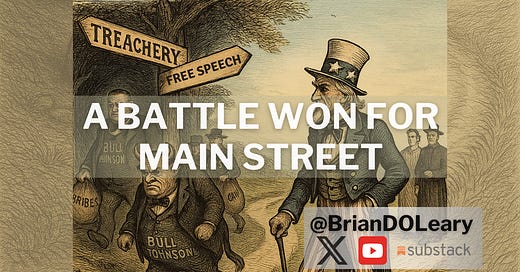In a court filing yesterday, the Internal Revenue Service (IRS) stripped away the Johnson Amendment’s iron muzzle from America’s pulpits, marking a stunning victory for middle-class citizens long silenced by an obscure tax code wrinkle. No longer, for instance, should priests tremble over threats of audit for calling out the moral bankruptcy of candidates, especially those professing Catholic faith while espousing radical social agendas.
Yet as we cheer, let us cast a cold eye on the man behind the 1954 ban: Senator Lyndon Baines Johnson, whose pug-ugly politics birthed a rule that strangled free speech under the guise of charity.
According to presidential biographer Robert A. Caro, Johnson’s college classmates nicknamed him “Bull,” short for Bull [excrement], because he was so deeply untrustworthy and “the biggest liar on campus.”
Now imagine: It is July 2, 1954, and a jittery Johnson, fresh from fending off anti-communist foes in Texas, slaps his name on a provision designed to throttle voices daring to challenge his Senate ambitions. Johnson—later described in 1967 by journalist Robert Sherill as a “treacherous, dishonest, manic-aggressive, petty, spoiled, and above all, accidental” president—engineers a “tax code fix” that, conveniently, eviscerated the influence of rivals who used nonprofits to champion conservative causes.
His amendment—passed in a voice vote so perfunctory it might as well have been a party whip—would later be hailed as a bulwark of impartial churches. In truth, it was an act of raw political vengeance.
While tax exemptions existed for specific organizations from earlier legislation, the Internal Revenue Code was overhauled in 1954. The particular section “501(c)(3)” originates from Johnson’s dirty work.
For over seven decades, the Johnson Amendment has cast a “chilling effect on free speech,” forcing clergy to weigh divine duty against fiscal ruin. Hundreds of bishops, pastors, and lay leaders spent fortunes on legal counsel to ask: “May I speak truth to power from the pulpit?”
An answer often came, but with IRS auditors at their door.
This regulatory gamesmanship was not an accident but the very point of Bull’s gambit—a bureaucratic cudgel wielded to keep churches meek and silent.
Thanks to the latest interpretation from the IRS, churches may now endorse candidates in their “usual channels of communication” without risking tax status. Imagine a small‐town congregation where Father Jim once dared mention a candidate’s record on poverty relief—and then spent weeks fretting over audit letters. No longer.
Pastors can frame politics as a family discussion—a phrase lifted straight from Monday’s court filing—rather than intervening in campaigns. This is a massive win for people like that blue-collar mom in Dayton who wants moral clarity from her pulpit, the small business owner in Wichita who seeks faith-based economic guidance, and the Phoenix-area veteran who yearns for sermons on national service and character.
Furthermore, Middle America—the engine of this republic—regains its breathing room. The specter of IRS threats is fading, and communities may soon be able to engage openly in politics as citizens, rather than being terrified by tax liabilities.
Meet Joe Trumbull, a worn-out auto worker from Toledo. Every Sunday, Joe limped into St. Joseph, craving a sermon that strung Gospel values to real-world choices. Instead, he got broad homilies on faith with no hint of the moral stakes in voting. “I paid my tithe,” Joe remembers, “but my soul was starved for honesty.”
Now, Joe may hear from his pastor about the human cost of fiscal policy, the sanctity of life being tested at the ballot box, and why integrity matters more than the empty promises of career politicians. Joe will no longer have to endure vague lectures. He’s now part of the conversation—finally free to judge candidates by conscience, not courtesy.
Bull Johnson’s true motive shone in his own Senate floor remarks: he aimed to kneecap groups hitting him where it hurt. Facts Forum and the Committee for Constitutional Government dared critique his anti-communist posture, so he penned a rule to punish them—and all churches—under the same law. That law became a cudgel, and countless longtime tax-exempt charities tiptoed around politics, fearing the IRS’s unpredictable wrath.
Isn’t it ironic that the author of America’s most notorious free-speech embargo would later claim to defend religious liberty? Bull, the self-styled custodian of charity’s purity, unleashed unprecedented government oversight on sermons.
He boasted of protecting democracy by silencing preachers! That’s like hiring arsonists to guard the town firehouse.
Speak now, America, and without fear. Speak because the IRS no longer brands your faith community as a political threat. Speak because a republic thrives on debate, and the pulpit was meant to elevate, not mute, moral reasoning in public life.
This new IRS exception declares victory for the common folk and issues a dare to Bull Johnson’s legacy: let the churches speak.
Our Founders never intended faith to cower under tax penalties. Now, after decades of ecclesiastical muzzling in the name of impartiality, churches stand ready to shape civic discourse with moral courage.
To the late “Bull” Johnson, a man consumed by political spite, we say: The empire built on your amendment crumbles today.
Good riddance to treachery. Long live free speech.





